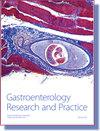内镜射频消融治疗反流性超敏反应的疗效:一项基于Rome IV标准的研究
IF 2
4区 医学
Q3 GASTROENTEROLOGY & HEPATOLOGY
引用次数: 2
摘要
目的对反流性超敏反应缺乏有效的治疗方法。内镜射频消融可通过直接干扰伤害感受器或迷走神经传入纤维来降低食管远端的敏感性,因此可能对反流超敏反应有用。本研究的目的是评估内窥镜射频消融治疗反流性超敏患者的有效性和可能的机制。方法招募符合罗马IV标准并希望接受进一步治疗的反流超敏患者。内镜下射频消融术应用于胃食管交界处。数据采用6点Likert量表进行问卷调查。主要的疗效指标是对包括烧心、反流和胸痛在内的症状的影响。次要结果是满意度、药物使用、酸暴露时间(AET)、食管括约肌低压力(LES)和总反流发作。我们还评估了从食管黏膜活检中获得的瞬时受体电位香草样1型受体(TRPV1)和降钙素基因相关肽(CGRP)的阳性细胞密度,这两种物质都是传入纤维的生物标志物。0.5 cm-1 Z线上方cm处。这些量表将在基线、3个月随访、6个月随访和12个月随访时使用。结果共有22名反流超敏患者入选(14名男性,中位年龄50.0岁)。症状评分(烧心、反流和胸痛)在3个月、6个月和12个月时有显著改善(P<0.001)。与基线相比,对生活的满意度在3个、6个和12个月中分别提高到72.7%(16/22)、72.7%(16/22)和68.2%(15/22)(P<0.01)。19名患者在治疗后减少了药物使用。其中,22.7%(5/22)、31.8%(7/22)和40.9%(9/22)的受试者分别在3个月、6个月和12个月停止用药。从术前到术后12个月,AET、LES压力或总反流发作没有统计学差异。治疗后,TRPV1和CGRP的阳性细胞密度均显著降低;只有TRPV1与烧心(r=0.51,P=0.03)和胸痛(r=0.77,P<0.01)呈正相关。需要进一步的大样本研究来验证射频在反流超敏反应中的作用。本文章由计算机程序翻译,如有差异,请以英文原文为准。
Efficacy of Endoscopic Radiofrequency Ablation for Treatment of Reflux Hypersensitivity: A Study Based on Rome IV Criteria
Objective Effective therapies for reflux hypersensitivity are lacking. Endoscopic radiofrequency ablation may reduce the sensitivity of the distal esophagus through direct interference with nociceptors or vagal afferent fibers and thus may be useful in reflux hypersensitivity. The aim of this study is to assess the effectiveness and possible mechanisms of endoscopic radiofrequency ablation in reflux hypersensitivity patients. Methods Patients with reflux hypersensitivity who fulfilled the Rome IV criteria and who wished to receive further treatment were recruited. Endoscopic radiofrequency ablation was delivered to the gastroesophageal junction. Data were collected by questionnaire using a 6-point Likert scale. The primary outcome measure was effect on symptoms including heartburn, regurgitation, and chest pain. The secondary outcomes were degree of satisfaction, medication use, acid exposure time (AET), low esophageal sphincter (LES) pressure, and total reflux episodes. We also assessed positive cell density of transient receptor potential vanilloid type 1 receptor (TRPV1) and calcitonin gene-related peptide (CGRP), both of which are biomarkers of afferent fibers, in biopsies obtained from esophageal mucosa 0.5 cm-1 cm above the Z line. These scales will be administered at baseline, 3-month follow-up, 6-month follow-up, and 12-month follow-up. Results A total of 22 reflux hypersensitivity patients were enrolled (14 males, median age 50.0 years). A significant improvement in symptom scores (heartburn, regurgitation, and chest pain) was noted at 3 months, 6 months, and 12 months (P < 0.001). Satisfaction with life increased to 72.7% (16/22), 72.7% (16/22), and 68.2% (15/22) at 3, 6, and 12 mo, respectively, compared with baseline (P < 0.001). Nineteen patients reduced their medication use after treatment. Of these, 22.7% (5/22), 31.8% (7/22), and 40.9% (9/22) subjects stopped medication use at 3 mo, 6 mo, and 12 mo, respectively. No statistical differences were noted in AET, LES pressure, or total reflux episodes from preoperation to 12 mo postoperation. After treatment, the positive cell density of both TRPV1 and CGRP decreased significantly; however, only TRPV1 had a positive correlation with heartburn (r = 0.51, P = 0.03) and chest pain (r = 0.77, P < 0.01). Conclusion Endoscopic radiofrequency ablation was an effective and safe therapeutic option in reflux hypersensitivity patients. Further studies with large sample size are required to validate the role of radiofrequency in reflux hypersensitivity.
求助全文
通过发布文献求助,成功后即可免费获取论文全文。
去求助
来源期刊

Gastroenterology Research and Practice
GASTROENTEROLOGY & HEPATOLOGY-
CiteScore
4.40
自引率
0.00%
发文量
91
审稿时长
1 months
期刊介绍:
Gastroenterology Research and Practice is a peer-reviewed, Open Access journal which publishes original research articles, review articles and clinical studies based on all areas of gastroenterology, hepatology, pancreas and biliary, and related cancers. The journal welcomes submissions on the physiology, pathophysiology, etiology, diagnosis and therapy of gastrointestinal diseases. The aim of the journal is to provide cutting edge research related to the field of gastroenterology, as well as digestive diseases and disorders.
Topics of interest include:
Management of pancreatic diseases
Third space endoscopy
Endoscopic resection
Therapeutic endoscopy
Therapeutic endosonography.
 求助内容:
求助内容: 应助结果提醒方式:
应助结果提醒方式:


